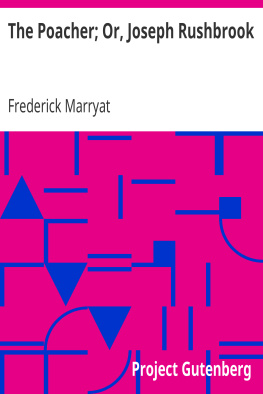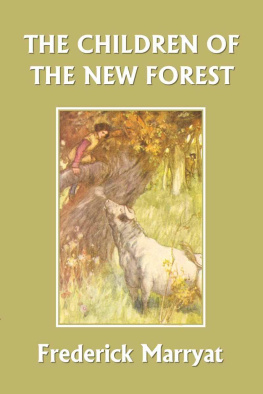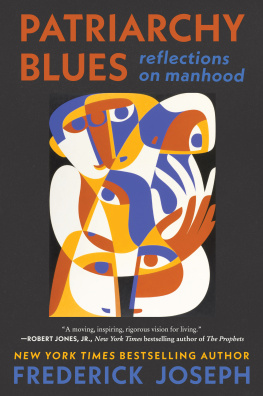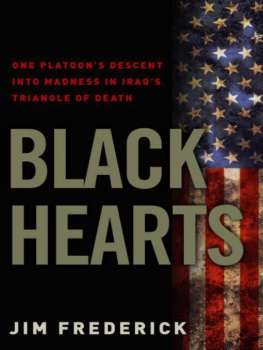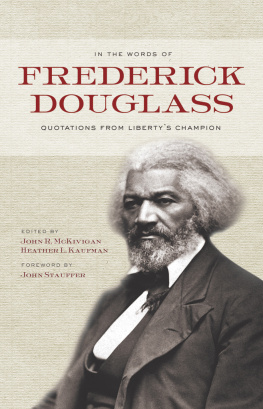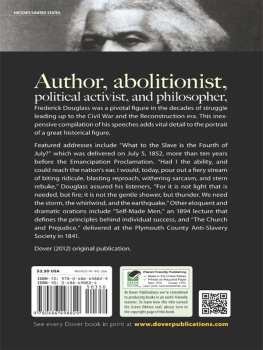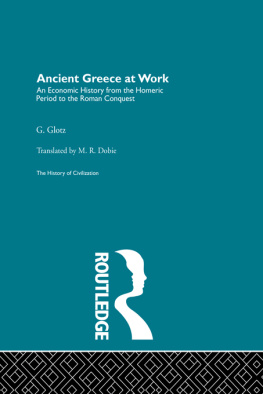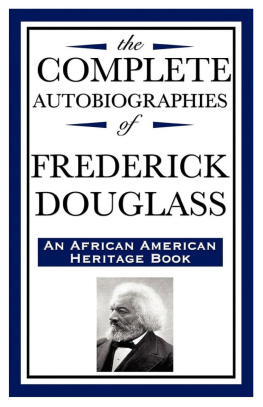Frederick Marryat - The Poacher; Or, Joseph Rushbrook
Here you can read online Frederick Marryat - The Poacher; Or, Joseph Rushbrook full text of the book (entire story) in english for free. Download pdf and epub, get meaning, cover and reviews about this ebook. year: 2007, genre: Detective and thriller. Description of the work, (preface) as well as reviews are available. Best literature library LitArk.com created for fans of good reading and offers a wide selection of genres:
Romance novel
Science fiction
Adventure
Detective
Science
History
Home and family
Prose
Art
Politics
Computer
Non-fiction
Religion
Business
Children
Humor
Choose a favorite category and find really read worthwhile books. Enjoy immersion in the world of imagination, feel the emotions of the characters or learn something new for yourself, make an fascinating discovery.
- Book:The Poacher; Or, Joseph Rushbrook
- Author:
- Genre:
- Year:2007
- Rating:4 / 5
- Favourites:Add to favourites
- Your mark:
- 80
- 1
- 2
- 3
- 4
- 5
The Poacher; Or, Joseph Rushbrook: summary, description and annotation
We offer to read an annotation, description, summary or preface (depends on what the author of the book "The Poacher; Or, Joseph Rushbrook" wrote himself). If you haven't found the necessary information about the book — write in the comments, we will try to find it.
The Poacher; Or, Joseph Rushbrook — read online for free the complete book (whole text) full work
Below is the text of the book, divided by pages. System saving the place of the last page read, allows you to conveniently read the book "The Poacher; Or, Joseph Rushbrook" online for free, without having to search again every time where you left off. Put a bookmark, and you can go to the page where you finished reading at any time.
Font size:
Interval:
Bookmark:
The Project Gutenberg EBook of The Poacher, by Frederick Marryat
This eBook is for the use of anyone anywhere at no cost and with
almost no restrictions whatsoever. You may copy it, give it away or
re-use it under the terms of the Project Gutenberg License included
with this eBook or online at www.gutenberg.org
Title: The Poacher
Joseph Rushbrook
Author: Frederick Marryat
Release Date: May 22, 2007 [EBook #21574]
Language: English
*** START OF THIS PROJECT GUTENBERG EBOOK THE POACHER ***
Produced by Nick Hodson of London, England
It was on a blusterous windy night in the early part of November, 1812, that three men were on the high road near to the little village of Grassford, in the south of Devonshire. The moon was nearly at the full, but the wild scud, and occasionally the more opaque clouds, passed over in such rapid succession, that it was rarely, and but for a moment or two, that the landscape was thrown into light and shadow; and the wind, which was keen and piercing, bent and waved the leafless branches of the trees which were ranged along the hedgerows, between which the road had been formed.
The three individuals to whom we have referred appeared all of them to have been indulging too freely in the ale which was sold at the public-house about half a mile from the village, and from which they had just departed. Two of them, however, comparatively speaking, sober, were assisting home, by their joint efforts, the third, who, supported between them, could with difficulty use his legs. Thus did they continue on; the two swayed first on the one side of the road, and then on the other, by the weight of the third, whom they almost carried between them. At last they arrived at a bridge built over one of those impetuous streams so common in the county, when, as if by mutual understanding, for it was without speaking, the two more sober deposited the body of the third against the parapet of the bridge, and then for some time were silently occupied in recovering their breath. One of the two who remained leaning on the parapet by the side of their almost lifeless companion was a man of about forty years of age, tall and slender, dressed in a worn-out black coat, and a pair of trousers much too short for him, the original colour of which it would have been difficult to have surmised; a sort of clerical hat, equally the worse for wear, was on his head. Although his habiliments were mean, still there was something about his appearance which told of better days, and of having moved in a different sphere in society; and such had been the case. Some years before he had been the head of a grammar-school, with a comfortable income; but a habit of drinking had been his ruin, and he was now the preceptor of the village of Grassford, and gained his livelihood by instructing the children of the cottagers for the small modicum of twopence a head per week. This unfortunate propensity to liquor remained with him and he no sooner received his weekly stipend than he hastened to drown his cares, and the recollection of his former position, at the ale-house which they had just quitted. The second personage whom we shall introduce was not of a corresponding height with the other: he was broad, square-chested, and short-dressed in knee-breeches, leggings, and laced bootshis coat being of a thick fustian, and cut short like a shooting-jacket: his profession was that of a pedlar.
Its odd to me, said the pedlar, at last breaking silence, as he looked down upon the drunken man who lay at his feet, why ale should take a man off his legs; they say that liquor gets into the head, not the feet.
Well, replied the schoolmaster, who was much more inebriated than the pedlar, theres argument even in that and, you see, the perpendicular deviation must arise from the head being too heavy, thats clear; and then, you see, the feet, from the centre of gravity being destroyed, become too light; and if you put that and that together, why, a man cant stand. You understand my demonstration?
It was heavy wet, that ale, and so I suppose its all right, replied the pedlar; but still ale ant poured into the head or into the feet of a man, but into the internals, which are right in the middle of a man; so, how do you make out your case, Mr Furness?
Why, Byres, you talk of the residuum.
Never said a word about it; and, as I stand here, never even heard the word before.
Perhaps not: the residuum is, you see, Byres, what is left.
If thats residgium, I didnt mean to say a word about it; there was none left, for you drained the pot.
Good, Byres; you have never been to college, thats clear. Now, observe, when a man pours down into his stomach a certain quantity of liquor, the spirituous or lighter part ascends to his head, and that makes his head heavy. Do you understand?
No; whats light cant make things heavy.
Cant it?you know nothing about the matter. Have you not a proof before you? replied the schoolmaster, reeling, and catching hold of the parapet for support; look at that unfortunate man, who has yielded to excess.
Very true; I see that hes drunk, but I want to know how it is that he got drunk?
By drinking.
That I knew before.
Then why ask any more questions? Had we not better proceed, and take him home to his expectant and unhappy wife? Tis a sad, sad thing, that a man should put an enemy into his mouth to steal away his brains.
Half a pint will do that with Rushbrook, replied the pedlar; they say that he was wounded on his head, and that half his brains are gone already, and thats why he has a pension.
Yes, seventeen pounds a year; paid quarterly, without deduction, and only to walk four miles to get it, replied Furness; yet how misplaced is the liberality on the part of the government. Does he work? No; he does nothing but drink and lie in bed all day, while I must be up early and remain late, teaching the young idea at twopence per week. Friend Byres, mercy is not itself which oft looks so. Now, it is my opinion that it would be a kindness to this poor wretch if we were to toss him, as he now is, over the bridge into the rushing stream; it would end all his troubles.
And save us the trouble of getting him home, replied Byres, who determined to humour his more inebriated companion. Well, Mr Furness, Ive no objection. Why should he live? Is he not a sinecuristone of the locusts who fatten on the sweat and blood of the people, as the Sunday paper says? Dont you remember my reading it this morning?
Very true, Master Byres.
What dye say, then?shall we over with him?
We must think a little, replied the schoolmaster, who put his hand up to his chin, and remained silent for a minute or two. No, resumed he, at last; on second thoughts I cannot do it. He halves his beer with me. No pensionno beer; thats a self-evident proposition and conclusion. It were ingratitude on my part, and I cannot consent to your proposal, continued the schoolmaster; nay, more, I will defend him against your murderous intentions to the very last.
Why, Master Furness, you must be somewhat the worse for liquor yourself: it was your proposal to throw him over the bridge, not mine.
Take care what you say, replied the schoolmaster; would you accuse me of murder, or intent to murder?
No, not by no meansonly you proposed heaving him over the bridge: I will say that.
Friend Byres, its my opinion youll say anything but your prayers; but in your present state I overlook it. Let us go on, or I shall have two men to carry home instead of one. Come, now, take one of his arms, while I take the other, and raise him up. It is but a quarter of a mile to the cottage.
Font size:
Interval:
Bookmark:
Similar books «The Poacher; Or, Joseph Rushbrook»
Look at similar books to The Poacher; Or, Joseph Rushbrook. We have selected literature similar in name and meaning in the hope of providing readers with more options to find new, interesting, not yet read works.
Discussion, reviews of the book The Poacher; Or, Joseph Rushbrook and just readers' own opinions. Leave your comments, write what you think about the work, its meaning or the main characters. Specify what exactly you liked and what you didn't like, and why you think so.

